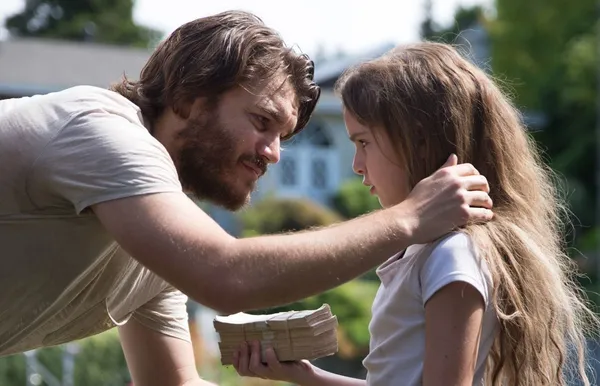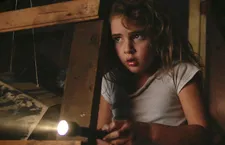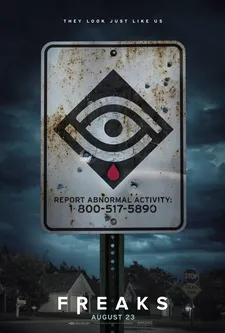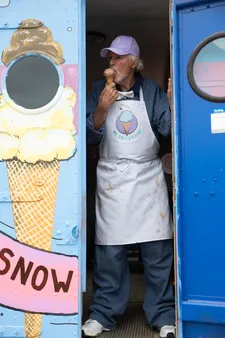 |
| Emile Hirsch and Lexy Kolker in Freaks Photo: Fantasia Film Festival |
The story of a seven year old girl, Chloë (Lexy Kolker), whose father tells her that she should never leave their home or bad people will kill her, Freaks is a rollercoaster ride of a movie that keeps building on its high concept premise and taking the viewer to unexpected places. It enjoyed a rapturous reception at Frightfest Glasgow earlier this year and recently screened at the Fantasia International Film Festival in Montreal. I arranged to speak to co-directors Zach Lipovsky and Adam B Stein whilst they were there.
Primarily a three-harder, the film also stars Emile Hirsch as Chloë’s father and Bruce Dern as the mysterious ice cream man who lingers outside their home in his truck. It’s a film that criss-crosses genres and has multiple layers of story. I start by asking how this complicated set of ideas came together.
 |
| Danger could be anywhere Photo: Fantasia Film Festival |
Adam responds first. “The first and most important thing is that we really just wanted to tell a sci-fi story from a child’s perspective and really get into Chloë’s head, and put the audience in that perspective, so that she’s figuring out the world as the audience is figuring out the world.”
“And that’s why the genre keeps changing,” puts in Zach, “because her perspective and her feeling is changing. So at the beginning she’s very scared and it feels very much like a horror film, you’re not sure what’s going on, and then she starts exploring the world and it feel almost like Spielberg. there’s wonder and exploration but there’s also tension so at moments it feels like a Tarantino movie and at moments it feels like a spectacle, a big budget movie, but it’s her perspective that’s driving all of that. We never really thought about what genre it was when we were writing. We just though about what is she going through and what is she feeling?”
There’s also a balance of things which, as adults, we recognise as potential dangers and things which aren’t really dangerous but seem scary to Chloë, I suggest.
Zach nods. “One of the things we thought was really interesting was Adam had a young son when we were writing and he would be terrified of normal things, like a car alarm, but think dragons are real and totally safe. By putting the audience in Chloë’s perspective, they don’t know what they don’t know. They’re told there’s dangerous things outside and they don’t know if that’s true or not, just like a kid doesn’t know... That horror and suspense comes from that perspective.”
The film drip feeds us information – a poster at the side of the highway, something we see on television but can’t put in context. How did they approach putting all those little clues in there without giving too much away?
 |
| Freaks poster Photo: Fantasia Film Festival |
“You know, we love sci-fi films and horror and all sorts of genre,” says Adam, “but we often feel when we go to movies that you can see where they’re going a mile away. In the first five minutes you kind of know what’s going to happen and there’s lots of big dumps of exposition early on to explain the world and what it’s all about. And some of our favourite movie-going experiences a film fans have been when we’re sitting in a theatre and we have no idea where the movie’s going and we’re just along for the ride, so that’s another thing that really inspired us. We wanted to only give the audience the minimum amount they needed to keep them on the ride.”
“If you don’t give them any information they get upset,” Zach observes. “It’s a real delicate balance to kind of keep them in mystery but also giving them little clues along the way so that they always feel like they’re getting answers but each time a new question is asked.”
Was it something that changed as the film developed?
“Oh yes!” says Adam.
“We tested the movie many, many, many times, like virtually every weekend while we were editing, we would show the movie to, like, five friends,” says Zach. “it’s really hard when you’re writing a mystery because you know all the answers. So you need to show it to people who don’t to see when they’re bored, when they’re confused, when they’re ahead of the story, and one of those things on the TV that you mentioned came from one of those tests where someone had a question about something and we realised we could add a little clue about it on the TV.”
“We were very much inspired by the way that Pixar and other animation studios approach their movies as an iterative process by doing as much as they can with the movie and then testing it and doing it all over again,” says Adam. “When we tried to apply that to apply that to live action in this movie...” he hesitates. “We didn’t have very much money to make this movie but we made up for it with sweat and blood and tears. We just kept at it and kept at it to keep improving it. We even did it during the script stage. We did staged readings of the script with actor friends in order to rewrite the script as we went.”
They get an extraordinary performance out of young Lexy Kolker that really elevates the film. How did they find her?
Both of them are keen to speak first. “She’s a true discovery,” says Adam.
 |
| Bruce Dern as Mr Snowcone Photo: Fantasia Film Festival |
“Yeah,” says Zach. “We searched all over North America. We flew people from New York, we flew people from LA, we shot the movie in Vancouver. We approached the audition process very differently. We’ve done a lot of stuff with kids before and they often come very sort of stale and very rehearsed, and we wanted a film that was very raw and authentic and felt like it was almost discovered, almost like a documentary. Kids aren’t usually actually like that because they super over-rehearse, because their parents want to make sure they know all the lines and they don’t screw it up so they come like little robots.
“During the audition process we did a whole bunch of stuff to kind of get them back to their natural state. We’d have them come in and instead of being behind a big scary table with a camera we were just sitting on the floor with our shoes off and some colouring books, and we’d just have them hang out for a little bit and we’d ask them about their lives. If the scene was about her arguing with her dad over ice cream we actually would ask them ‘What’s the last argument you had with your parents?’ And then we would improvise that scene with them.”
I ask if parts of what we see on the screen were improvised too.
“We would do improv to get in the right emotion,” says Zach. “And then we would slowly work in the lines. And then we would do the lines, add around the lines, go back to the beginning and we would roll for a really long time with her. Emile Hirsch was a really big help.”
“And Bruce too,” adds Adam. “Bruce is a great one for improvising. And so we would use the scenes as written as a starting point but then they would riff off them, and Lexy was really the best young actor who could work in that way. She made it her own. We actually told her parents ‘Don’t learn the scenes. Read the scenes so you know what they’re about but don’t come with the lines memorised.’ Because her lines are fairly simple. We really wanted to keep it personal and grounded and the emotion behind the lines was more important.”
Coming up: Zach Lipovsky and Adam B Stein on Bruce Dern’s return to science fiction and the art of making an epic film on a tiny budget.





















